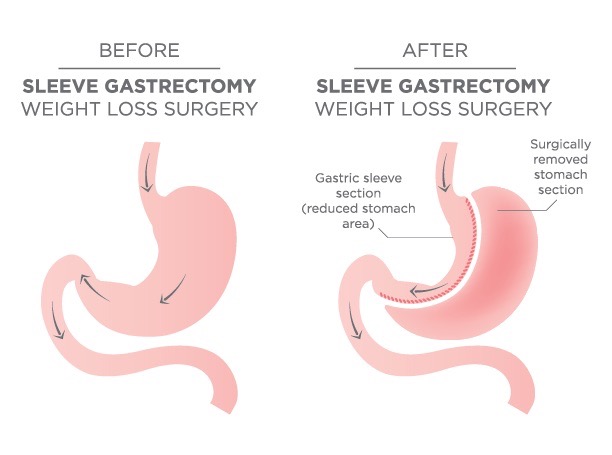
Bariatric Surgery
Dignity Health’s Bariatric Surgery program at Sequoia Hospital offers a multidisciplinary, personalized, and collaborative approach to weight loss. For qualified candidates, risks associated with staying significantly overweight exceeds the risk of surgery. Our team is here to help you find a life of improved health, activity, and longevity.
Our team will be with you every step of the way on your weight loss journey.

Adults healthy enough for major surgery who’ve been unable to lose weight through diet and exercise, and whose BMI is:
- Greater than 40
- Between 35-39, with obesity-related health conditions
- Between 30-34, in some circumstances
- Type II diabetes remission
- Decreased blood pressure
- Increased mobility
- Reduced risk of cardiovascular disease, cancer, and stroke
- Improved overall health
- Increased life expectancy
- No program fee
- The staff associated with our Bariatric Surgery Program will be with you every step of the way on your weight loss journey, from our introductory education session and physician consultation to nutrition counseling, weight loss surgery, and post-surgery support. We are here to help you develop the tools to begin your new life—a life of improved health, activity, and longevity.
Bariatric Surgeons
John J. Feng, MD, FACS
Dr. John Feng attended medical school at the University of California, San Francisco where he also trained as a general surgery resident. He then completed a specialty fellowship at Mount Sinai Medical Center in New York City in advanced laparoscopic and minimally invasive general and bariatric surgery. Dr. Feng has experience in advanced laparoscopic and robotic surgery for conditions including morbid obesity, acid reflux, hernias, achalasia, tumors, stomach ulcers, gastroparesis, adhesions, and gallbladder disorders. Dr. Feng is Board Certified by the American Board of Surgery and is a Fellow of the American College of Surgeons.
Beemen Khalil, MD, MS
Dr. Beemen Khalil attended medical school at St.George’s University School of Medicine in Grenada, West Indies, and completed his residency in general surgery at Harlem Hospital Center in New York. Dr. Khalil is fellowship trained from the University of California, San Francisco in advanced laparoscopic (minimally invasive) and bariatric surgery. He specializes in da Vinci Robotic Surgical System procedures including Nissen Fundoplication, paraesophageal hernia repair, adrenalectomy, colectomy, splenectomy, gastrectomy, ventral hernia repair, SILS cholecystectomy, and sleeve gastrectomy. Dr. Khalil is Board Certified by the American Board of Surgery in General Surgery.
Ryan Macht, MD, MS
Dr. Ryan Macht attended medical school at New York University School of Medicine, received surgical training at Boston University Medical Center, and received his fellowship in Bariatric and Minimally Invasive Surgery at University of California, San Francisco. He is Board certified in General Surgery and Obesity Medicine and provides patient-centric, compassionate care to all of his patients. Dr. Macht treats a variety of conditions including hernias, gallbladder disease, obesity, gastroesophageal reflux disease, and esophageal motility disorders.
Weight Loss Surgery Procedures
Sequoia Hospital offers patients two types of weight loss surgery:
Roux-en-Y Gastric Bypass
The surgeon divides the stomach into two portions. The top portion is a small pouch approximately the size of a golf ball. Food enters this pouch and then travels rapidly to the small intestines. The remaining portion of the stomach is bypassed when the surgeon divides the intestines and reroutes the digestive pathway. This produces hormonal changes that allow for substantial weight loss and remission of type II diabetes.
Sleeve Gastrectomy is performed using surgical staplers to remove nearly 70% of the stomach permanently. The new stomach cannot hold as much food. Weight loss occurs due to hormonal changes that decrease hunger and increase satiety.

Important Facts About Obesity and Bariatric Surgery
Patients who choose bariatric surgery to help them lose weight can achieve long-lasting weight loss. Here you’ll find important facts about obesity and bariatric surgery. Learn More
We understand that each procedure may have a different weight loss outcome. This is why your care team will sit down with you before surgery to discuss every potential outcome your body may experience post-surgery. On average, people lose 50–80 percent of their excess body weight in the first year depending on the:
- Type of surgery performed
- Level of commitment to the post-surgical diet and exercise regimen
- Regularity of medical follow-up
As with any surgical procedure, there are risks associated with bariatric surgery. You and your surgeon will discuss specific risks related to your individual health condition and your selected surgical procedure.
At Dignity Health, we believe that your state of mind is a catalyst for healing. We want you to be fully prepared before having surgery. We will enroll you in a bariatric surgery education program that prepares you, not just for surgery, but also for life afterwards. During the program, you will receive nutrition counseling, undergo physical exams, and be given a psychological evaluation. From a lifestyle perspective, there are many things you can do to prepare your body for bariatric surgery:
- Start a preoperative diet: Your care team may suggest that you change your nutrition prior to surgery and will work with you to develop a healthy diet.
- Quit smoking: If you are a smoker, you may already know that to quit smoking is a healthy choice. Your care team will highly recommend that you quit prior to surgery as the termination will optimize the healing process.
- Exercise regularly: As with diet, exercise will be a key part of recovery and long-term weight loss. Light exercise before surgery will help you increase your lung capacity and prepare you for an active post-surgery life.
Immediately after bariatric surgery, there will be some pain and discomfort. Our highly-skilled and sensitive care team will offer you the right medications to help you feel better. Most patients stay in the hospital one night after surgery and then return to normal activity within two to three weeks.
During the first week of your recovery, we will recommend that you only ingest liquids. We will then guide you as you gradually progress to pureed foods, soft foods, and then to regular foods about one to two months after surgery. You will need to chew your food slowly and fully. You may experience a very fast weight loss initially, so it is important to get all of the nutrition, vitamins, and hydration you need. Your doctor will also recommend supplements.
During weight loss, you may experience fatigue, chills, body aches, dry skin, mood changes, and temporary hair thinning. However, as your weight stabilizes, you may find out that these problems fade out.
Weight loss typically continues for about a year and then abates. You should use the first year to develop good eating and exercise habits that will keep you from regaining weight.
Many weight-related health problems improve or even disappear after bariatric weight loss surgery, including diabetes, high blood pressure, asthma, and obstructive sleep apnea.
Adjusting to life after bariatric surgery can be challenging physically, socially, and emotionally. The support from a family, friends, or a caregiver can make a world of difference. While people who undergo bariatric surgery usually do not need intensive help, having support on-hand is key.
Immediate post-surgery care — people typically take three weeks off from work. In the early weeks, you may have low energy. You may need assistance with house activities, shopping, and childcare until you can lift and drive, usually in about two weeks.
Dietary support — your diet will be restricted as you will progress gradually from liquid to low-volume meals. You should educate your support system on the guidelines and restrictions to help you succeed. Look up recipes to make healthy choices fun and interesting. Ensure that you take all vitamins and supplements according to your doctor’s prescriptions.
Physical activity support — regular exercise is necessary for maintaining a healthy metabolism throughout the weight loss process. Your friends and family can support your active schedule by getting involved. Go for evening walks together. Go to an attraction that requires walking (such as the zoo), which will not only improve your physical health, but also lift your spirits. Frequent walking is the best medicine after surgery.
